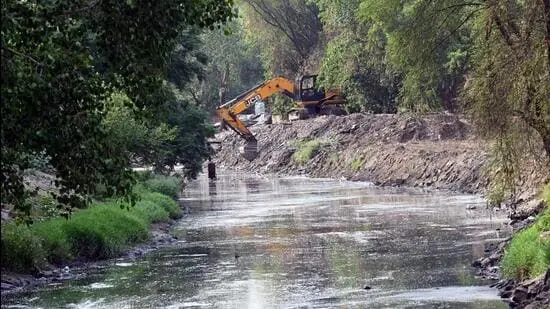
The Delhi Jal Board (DJB) has informed the National Green Tribunal (NGT) that it has floated an expression of interest (EOI) to begin in-situ treatment across 43 stormwater drains that are bringing sewage to the Barapullah drain, a step it said will help address the foul smell emanating from these drains.
The water utility added that it has also begun preparing an action plan covering both sewered and unsewered areas within the Barapullah drain basin.
Responding to the tribunal on measures being undertaken to prevent sewage from reaching the Barapullah drain and, eventually, the Yamuna, the DJB said, in an affidavit dated October 11, that it has approached district magistrates and the Delhi Development Authority (DDA) to provide old revenue records to help identify the original width and length of these stormwater drains, in order to remove encroachments.
“It is humbly directed that the NGT may direct the DDA – which is also a party to the present proceedings – to provide clear and decipherable revenue records for accurate demarcation of the drain corridors and adjoining land boundaries and for carrying a physical survey of drains and sub-drains in coordination with the DJB task force,” the submission said.
The DJB also said for sustained vigilance and coordinated action, it constituted a dedicated task force under the chief engineer (south). “It is specifically mandated to prevent the ingress of sewage into storm drains and the identification of all potential sources of wastewater or sewage inflows entering stormwater drains,” the affidavit said.
The utility added that it will deploy internal financial resources for minor works and sewer connectivity in already sewered areas, while funding assistance has been sought from the National Mission for Clean Ganga (NMCG) for major infrastructure projects, including construction of new decentralised sewage treatment plants (DSTPs) and associated sewer lines.
The NGT is hearing multiple petitions, including one filed by the Nizamuddin West RWA, seeking urgent remedial measures to rejuvenate and revive Delhi’s stormwater drains. Residents have argued that non-desilting of drains has led to waterlogging in large parts of South Delhi during the monsoon.
The DJB also flagged on-ground challenges, including non-availability of land to set up three DSTPs and the inability to lay sewer lines in unauthorised colonies on forest land. It said community toilet regulations were not being enforced in JJ clusters.
After being informed that the Barapullah drain was being polluted by 43 stormwater drains carrying sewage into it, the NGT, during a hearing on August 20, had rejected the DJB’s proposal to connect these drains to DSTPs, calling for a more permanent solution to the problem. The tribunal had said connecting drains to DSTPs was only a temporary measure and directed the DJB, the Delhi government and other agencies to work out a long-term plan to ensure sewage does not enter stormwater drains.
